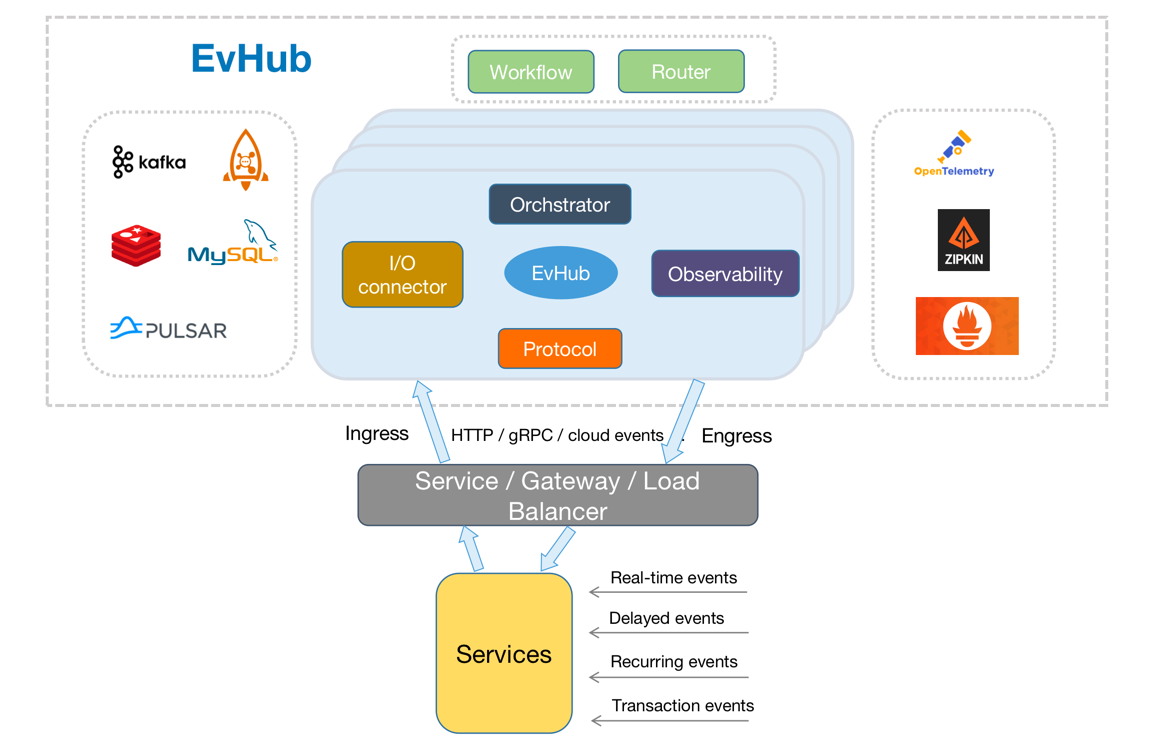English | 简体中文
 EvHub is an event-driven runtime that provides unified event model, retrieves asynchronous events, and distributes events to application scenarios to decouple upstream and downstream systems. Support real-time, delay, loop and transaction event scenarios, to achieve high real-time, high reliable general event components. It makes it easy for developers to build event-driven architecture stateless microservices.
EvHub is an event-driven runtime that provides unified event model, retrieves asynchronous events, and distributes events to application scenarios to decouple upstream and downstream systems. Support real-time, delay, loop and transaction event scenarios, to achieve high real-time, high reliable general event components. It makes it easy for developers to build event-driven architecture stateless microservices.
- Multi-protocol: Supports multiple protocols, such as HTTP and gRPC
- Support for transactional messages
- Supports delay events, including normal delay events and delay processing events
- Recurring events are supported, including regular recurring events and crontab events
- Supports multiple event stores: Kafka, Pulsar, Mysql, Redis, etc
- Support for multiple microservice architectures
- Supports high availability and easy horizontal expansion
EvHub can be applied to data consistency problems in a large number of scenarios,here are a few common ones
- Peak cut
- Broadcast
- Cache management
- System decoupling, event driven: Greatly simplifying the architectural complexity
- Distributed transaction
make startmake stopcurl --location --request POST '127.0.0.1:8081/v1/producer' \
--header 'Content-Type: application/json' \
--data-raw '{
"producer_conf_info":{
"app_id":"eh",
"topic_id":"test",
"tx_protocol_type":0,
"tx_address":"addr",
"tx_callback_interval":5000
}
}'
curl --location --request POST '127.0.0.1:8081/v1/processor' \
--header 'Content-Type: application/json' \
--data-raw '{
"processor_conf_info":{
"dispatcher_id":"evhub_eh_test_addr1",
"app_id":"eh",
"topic_id":"test",
"timeout":5000,
"protocol_type":"grpcSend",
"addr":"ip:6001",
"retry_strategy":{
"retry_interval": 5000,
"retry_count":3
}
}
}'
package main
import (
"context"
"time"
"github.com/tencentmusic/evhub/pkg/gen/proto/comm"
"github.com/tencentmusic/evhub/pkg/grpc"
"github.com/tencentmusic/evhub/pkg/grpc/interceptor"
"github.com/tencentmusic/evhub/pkg/log"
eh_pc "github.com/tencentmusic/evhub/pkg/gen/proto/processor"
eh_pd "github.com/tencentmusic/evhub/pkg/gen/proto/producer"
ggrpc "google.golang.org/grpc"
)
func main() {
serverAddr := ":6001"
addr := "127.0.0.1:9000"
timeout := time.Second * 5
conn, err := grpc.Dial(&grpc.ClientConfig{Addr: addr, Timeout: timeout})
if err != nil {
log.Panicf("dial err:%v", err)
}
defer conn.Close()
// grpc client
rsp, err := eh_pd.NewevhubProducerClient(conn).Report(context.Background(), &eh_pd.ReportReq{
Event: &comm.Event{
AppId: "eh",
TopicId: "test",
},
Trigger: &comm.EventTrigger{
TriggerType: comm.EventTriggerType_EVENT_TRIGGER_TYPE_REAL_TIME,
},
})
if err != nil {
log.Panicf("report err:%v", err)
}
if rsp.Ret != nil && rsp.Ret.Code != 0 {
log.Panicf("report failed rsp:%+v", rsp)
}
log.Infof("report success rsp:%+v", rsp)
StartGrpcServer(serverAddr, &Svc{})
}
type Svc struct{}
func (s *Svc) Dispatch(ctx context.Context, req *eh_pc.DispatchReq) (*eh_pc.DispatchRsp, error) {
log.Infof("ctx:%v req:%+v", ctx, req)
return &eh_pc.DispatchRsp{}, nil
}
func StartGrpcServer(serverAddr string, s *Svc) {
opts := []ggrpc.ServerOption{
ggrpc.ChainUnaryInterceptor(interceptor.DefaultUnaryServerInterceptors()...),
}
server := grpc.NewServer(&grpc.ServerConfig{
Addr: serverAddr,
}, opts...)
eh_pc.RegisterevhubProcessorServer(server.Server(), s)
if err := server.Serve(); err != nil {
log.Panicf("grpc failed to serve: %v", err)
}
}If you want more quick start examples, please refer to quick-start-sample
If you think this project is interesting, or helpful to you, please give a star!